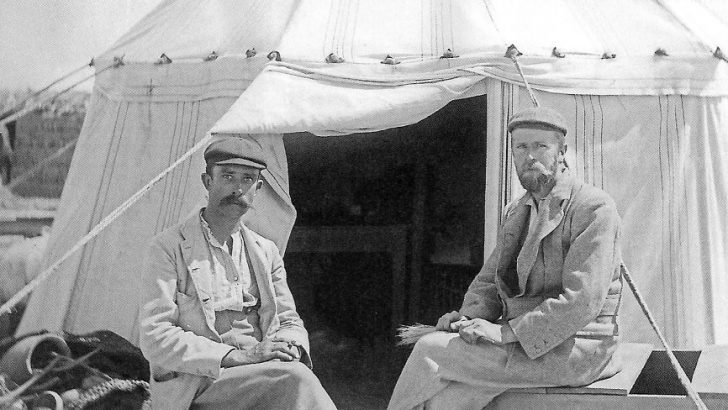Mainly about Books
In the winter of 1897 two English explorers found in the municipal rubbish heaps of an ancient city called Oxyrhynchus (120 miles south of Cairo) a fragment of a papyrus, dating from the 2nd or 3rd Century. The text written on it was one hitherto unknown.
The single leaf contained parts of seven short sentences of Christ. Each began “Jesus says…” These were to be added to, and became known as “the Secret Sayings of Jesus”.
The fifth saying (or logion) ran: “Wherever there are two, they are not without God; wherever there is one alone, I say I am with him. Raise the stone, and there you will find me; cleave the wood, and there I am.”
The explorers were Oxford academics, Bernard P. Grenfell and his friend Arthur S. Hunt. This expedition in 1896-1897 was their second for the Egyptian Exploration Society. Oxyrhynchus, then deserted, at one time had housed 10,000 monks and 12,000 nuns. Such a place, the two scholars thought, might well conceal ancient Christian manuscripts. And so it turned out.
At first they were unsuccessful, but then they change to the rubbish heaps, 70 feet high, which laced across the ruins. Their attack on the heaps began on January 11, 1897. A few days later Hunt, in sorting through what had been found, came upon a fragment with the word karphos, ‘mote’, on it. This recalled to him the famous passages in Mathew and Luke.
Further sorting revealed seven sayings on a single leaf, each one beginning “Jesus saith”. Three were identical with New Testament passages, one was unreadable, and the last three were entirely unknown – including the logia quoted above.
Debates
These passages, copied about 200 AD, moved back the Christian record then known by about a century and a half. At one stroke the 300 years separating Christ’s career on earth from a surviving account was cut in half.
The quick publication of these finds by Grenfell and Hunt opened debates which continue. Later finds, such as those in the caves of the Dead Sea, would further change perspectives on early Christianity.
As can be imagined, an article in a popular American monthly by Grenfell, ‘The Oldest Record of Christ’s Life’, caused great excitement. What the early Christians believed became, and remains, a complicated issue.
For their first publication the pair selected 158 texts in fairly good condition. But they had brought back some 1,200 documents. These filled 25 packing cases, weighing two tons. The publication of the fragments is still not complete today.
This famous classic find has been suddenly spotlighted by a strange affair involving an American Museum of the Bible, sponsored by a millionaire store owner and an Oxford academic of American origin who was dismissed from his post as general editor of the Oxyrhynchus papyri this summer.
Further sorting revealed seven sayings on a single leaf, each one beginning ‘Jesus saith’”
The museum announced that some early New Testament fragments were to be returned to Oxford University and the Egyptian Exploration Society. The role of the academic, Dirk Obbink, is under investigation.
These matters have yet to come to court, as they undoubtedly will. But at the heart of the matter is the overwhelming desire of the American Evangelical movement to obtain ‘proof the Bible is true’, in a very literal sense.
To do this they are prepared to come to terms with shadowy figures who deal with stolen, or illegally traded materials, and when these are not available, to forge them.
This has been going on for centuries. Arthur Hunt himself wrote in 1926 an observation that is pertinent: “Might it be more satisfactory, perhaps in the long run more economical, to go to the source and to dig papyri up for one’s self instead of buying them at second or third hand and thereby encouraging illicit traffic.”
What he said at the end of his career is true today. Believers in the truth of the Bible cannot act like pirates. If they wish to help establish the truth they must do it through legal channels, and through accredited institutions, not through dubious underhand dealings, which sometimes also involve corrupt officials as well as criminal networks in Israel and Egypt.
God’s truth deserves nothing less, many might think.


 Peter Costello
Peter Costello
